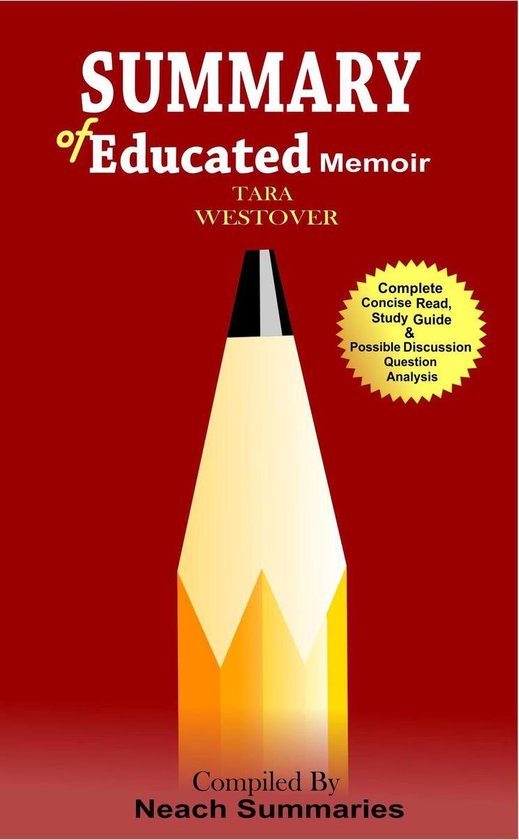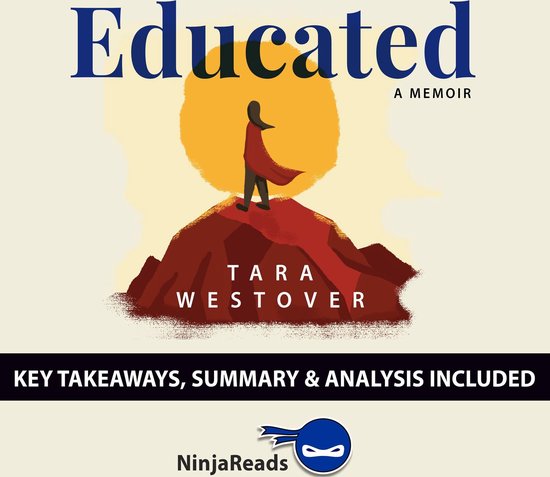- Tara Westover Educated Movie
- Tara Westover Educated Quotes With Page Numbers
- Tara Westover Educated Family Pictures
Though I graduated only a few weeks ago, I already find myself missing the engaging conversations and intellectual curiosity of my college campus. Reading the memoir Educated by Tara Westover with my book club over the past week challenged me to think critically about educational disparities across the country and the importance of access to education. The magnification of educational inequities exposed by the coronavirus demonstrates that learning looks vastly different for students across America, especially because of the urban-rural divide. In this article, I discuss three of my takeaways from reading this memoir and link Westover’s narrative to the educational divides we see today.

Tara Westover is the youngest of seven children born to Val and LaRee Westover. She was born in the small farming community of Clifton Idaho in 1986. Tara has always been a social butterfly and was involved in her community from a very young age. Tara was educated at home by her mother who sacrificed much for her children. Educated (2018) is a memoir by the American author Tara Westover.In it, Westover recounts overcoming her survivalist Mormon family in order to go to college, and emphasizes the importance of education to enlarging her world.
Fear Limits Opportunities for Learning
Now a college-educated woman in her thirties, Westover writes much of the memoir as a recollection of her upbringing. Prior to beginning her studies as a teenager at home, Westover experienced no formal education, instead learning how to can peaches and take care of farm animals in rural Idaho. Though early in her life her grandmother offered to take her to Arizona and enroll her in schools, Westover recalls letting the opportunity slip past her. Many fears paralyzed Westover throughout her childhood. Ridicule from her peers of her inability to read created a fear of trying new things. Her survivalist father instilled a fear of the federal government and public schools. A strict religious upbringing produced a fear of sin and learning. Her older brother going to college and leaving the family behind instilled a fear of abandonment and estrangement.
Fear limits educational potential for millions of students across America. Some students fear the rising costs of college in a harsh economy will keep them in debt for decades. Students who may have excelled early in school fear the intellectual challenges of high school and college because they could potentially lead to failure. Other students fear the unknowns of academic institutions, 1often because they are the first members of their families to enroll in college or earn a high school diploma. Westover’s memoir and her leap of faith to prepare for college demonstrates the need for greater student support and encouragement that can mitigate fears about education. This support should take the form of counseling services for younger students that address both emotional needs and academic development.


Economic Support Leads to Success
Without the support of her family, Westover was forced to take on all the economic burden of college herself. Balancing multiple jobs at once and maintaining high grades to keep her scholarship threatened her mental health at Brigham Young University. She worked for her father in physically and emotionally abusive conditions in order to make ends meet. Fortunately, Westover met with a local bishop, who helped her to secure additional funding for college. This chance not only gave her economic stability, but also invigorated her love for education. She changed her major to pursue her passion for history and accepted opportunities to go to graduate school abroad, eventually earning her Ph.D. in history.
Westover’s story reflects the positive outcomes that occur when first generation college students receive sufficient support. Scholarships for first generation students, as well as mentorship programs and dedicated academic resources, significantly improve the college experience for this population. Westover recalls her academic mentor advising her, “First find out what you are capable of, then decide who you are.” Many first generation college students feel tremendous pressure to succeed as pioneers in their family. They also report feeling unsure about how to make the most of college because of its unfamiliar environment. Though first generation students often need tailored support to help them take full advantage of opportunities at college, their status as first generation students make them some of the most driven, motivated, and passionate members of a campus community.
Education is a Bridge to Personal Growth
Though Tara Westover began life in a rural survivalist community in Idaho and first stepped into a classroom at age 17, she eventually developed a community of academic peers at institutions such as Harvard and Cambridge University. By following in the footsteps of her brother and challenging herself to grow intellectually and personally, she overcame tremendous barriers to educational success. Westover reports that the hardest part of her educational journey was the estrangement from her family that developed as she became more independent; however, she concludes the memoir with great pride about her accomplishments and her identity.
Westover demonstrates that education can serve as the bridge to personal and intellectual growth. Throughout the memoir, her perspective broadens as her academic journey leads her to learn about the world in new and transformative ways. Westover’s experiences highlight the absolute essentiality of access to education for all. The UN Universal Declaration of Human Rights argues that access to education is a fundamental human right. As we adapt to a globalized world in which education becomes more and more essential for career and personal success, we must learn from experiences like Tara Westover’s and actively work to strengthen access to fair and equal education for all.
- Book Club Recap: The Most Good You Can Do - March 8, 2021
- World Day of Social Justice 2021: Unveiling Social Justice Issues in the Digital Economy - February 20, 2021
- How do we Measure Poverty? Taking a Multidimensional Approach - January 28, 2021
Tara Westover Educated Movie
Essay 3: Educated What does it mean to get an education? We frequently discuss its economic value; but we say relatively little these days about what it means to emerge from our communities, our families and neighborhoods – all those forces that have shaped us – and find ourselves having to think about new perspectives, ideas, and knowledge. What do we learn from this experience? What does it cost us?
Westover’s book explores her own education. Her teachers were, amongst others, the mountain; her older brother Tyler, who introduced her to music and books; her older brother Shawn, whose abuse shaped her sense of self growing up; her parents, who love her but insist on her accepting their version of reality; her Mormon faith; then, later, her college friends and teachers; the books she read; and the events, ideas and perspectives she learned about.
For your third essay, you will discuss an idea about education emerging from Westover’s memoir (we will be creating essay questions in class). A discussion is not exactly an argument – you are not taking a controversial position and attempting to convince an opponent – but it is not a summary or a review. Rather, you are identifying an interesting idea or theme in the book, one that you connect with, and explaining this theme to the reader, illustrating it with specific evidence from concrete details of the book (quotes, scenes, dialog).
Some suggestions from class discussion (you’re welcome to address another question! but run it by me first):
1. Westover arrives at college, knowing virtually nothing about school or social life. But her unconventional family and educational background has given her some strengths, as well. Identify and discuss the most important advantages and disadvantages she derives from her background, and consider whether, on the whole, her upbringing is a benefit, or an obstacle to her success.
2. “Tara Westover is living proof that some people are flat-out, boots-always-laced-up indomitable” (USA Today). But does Westover achieve her success alone? Identify some ‘turning points’ – points in her story where she receives crucial help of any kind (pep talk, good advice, financial or other support, etc.). Discuss how these interventions help her on her journey.

3. In an interview with the Irish Times, Westover says “You can love someone and still choose to say goodbye to them, and you could miss someone every day and still be glad they’re not in your life.” She had to choose, she says, between loyalty to her family and loyalty to herself. What does she mean by this? Discuss how her education – both in and out of the classroom – makes it impossible for her to remain part of her family.
4. Westover says that her life is “narrated for me by others” (p. 197). Her brother Shawn, her father and mother, and even her Mormon faith, have to some extent defined her to herself – “and there’s no greater power than that” (p. 199). What are some of these definitions or expectations that are put on her? How do these affect her, and how does she get over them?
Tara Westover Educated Quotes With Page Numbers
5. Westover’s education ultimately requires that she rethink just about everything she thought was true. Explore some of the moments when she learns something new about the world or about herself, or when she encounters a new perspective on familiar things, and consider: What is this experience like, overall? Is it difficult, painful, rewarding?
Tara Westover Educated Family Pictures
6.Westover is a historian, and is constantly intrigued by the question of who gets to write history. Why does this question resonate with her? How does she apply this to her own life? As she writes her own history, do you find her trustworthy? Why or why not?
7.”You have learned something. That always feels, at first, as if you had lost something.” (Major Barbara, George Bernard Shaw). How does this quote apply to Westover’s life?
Essay requirements / highlighted skills:
- 1200-1500 words
- Plenty of relevant evidence and support, drawn from Educated AND from at least one other source
- Evidence of careful reading, reflection, and analysis
- Clear thesis, organization, development, well-chosen introduction & conclusion
- Sentences should be focused, logically joined, with well-chosen modifiers and well-integrated quotes (MLA not required)
Get 15% discount on your first order with us
Use the following coupon
FIRST15

